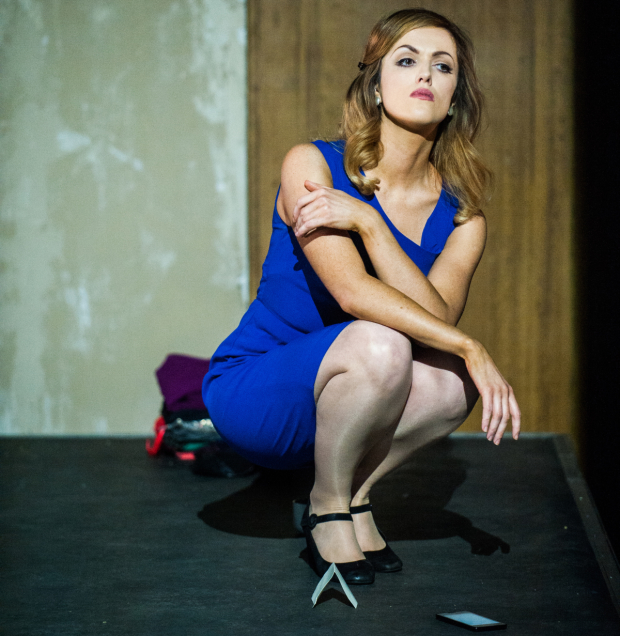The Last Hotel

(© Teddy Wolff)
A chilly haze — a feeling akin to walking along the East River on a rainy January afternoon — hangs over The Last Hotel, Enda Walsh (Once) and Donnacha Dennehy's new opera, now making its American premiere at St. Ann's Warehouse as part of the Prototype Festival. It is a fog that audiences might recognize from Lazarus, Walsh’s recent collaboration with the late David Bowie. Distant and icy, the piece wraps itself in a thick layer of mystery that would be incredibly enticing if it weren't quite so dull.
The story (inspired by a controversial 2002 case in which an Irish woman took her own life with the help of two Americans) follows a well-dressed Irish woman (Claudia Boyle) who meets an English husband (Robin Adams) and wife (Katherine Manley) at a seaside resort. She has contracted them to assist in her suicide. Their initial nervous encounter cedes to the husband’s exuberance about the buffet and the Irish woman’s yearning for death. The wife remains hesitant, longing for any ounce of affection from her husband (Manley valiantly tries to get us to care about this B-plot, but it never feels as important as the life and death stakes happening across the stage). Following several passages of contemplation, they rehearse the Irish woman’s suicide with a gas tank and plastic bag.
That hyperrealistic dry run is the most gripping part of the whole show. Seeing the affable Boyle hyperventilate into the transparent sheathe affixed to her head is deeply unsettling. Unfortunately, no other moment conveys this much dramatic tension. For an artist accustomed to working in contemporary theater, Walsh surprisingly relies on the "park and bark" staging of an earlier era of opera. Boyle and Manley each have long passages in which they sing about their respective emotional states while standing in one place. It verges on soporific. A harried porter (Mikel Murfi) scurries around serving drinks, cleaning up, and attempting to add urgency to the proceedings. He only half succeeds, coming off more like a glorified stagehand.
Boyle's performance is far more compelling. With a habitual half-smile and frightening sincerity she sings, "To feel my throat close with that need – my heart ache with that need – my stomach sour, my brain tear with that killing need." Dennehy accents her darkest thoughts with an uncomfortable slide into dissonance, moments that Boyle charges through with her implacably determined straight tones. The effect is hair-raising. Despite her cheery demeanor, one gets the sense that this woman really wants to die, and that contrast is highly disturbing.

(© Teddy Wolff)
Adams’ performance is less nuanced, flying past manic into the realm of the psychotic: He stuffs his mouth full of Pringles as he assaults the porter. He sings his lines into a giant fuzzy microphone like a rock star. It’s simultaneously terrifying and hilarious, one of the few spots of levity in a generally dreary opera about euthanasia.
Dennehy's harmonically complicated, rhythmically sophisticated music provides an ornate setting for Walsh’s banal libretto. Violent strings and flighty woodwinds perform a complicated acrobatic routine as the husband sings, "They got themselves a buffet, look. Is there a better way to eat? I don’t think there is! To queue for your food is pleasurable when it’s you who does the choosing. People tend to pile their plate – but not me. I respect the buffet." These lines are delivered in a rich baritone, the kind of voice one might hear at the Met, which feels out of place here.
Adding to this clash of form and content is David Sheppard and Helen Atkinson's consistently jarring sound design: Trashy electronic sounds (an angry voicemail, a blaring television, '90s pop) rudely pierce through Dennehy's complex wall of sound. It's a bit overwhelming, as is Jamie Vartan’s deceptively superfluous set: It features a large raised platform in the center where most of the action takes place. Props and other installations (most of which remain untouched) occupy the naked wing space, suggesting a ghostly storage room. Walsh and Vartan should be applauded for employing the full enormity of the new St. Ann's Warehouse, even though most of the set comes off like window dressing.
The Last Hotel succeeds when viewed as a concert presentation (the orchestra sounds flawless under the steady baton of André de Ridder). As a work of drama and stagecraft, however, it seems to be lacking some essential connective tissue that could pull together this fascinating story with its innovative musical setting.











